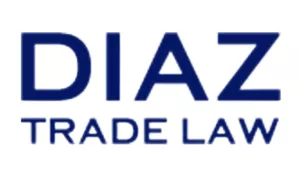Diaz Trade Law is enthusiastic to announce Bloomberg Law published another one of our articles, "Significant Updates to BIS Enforcement Policies in 2022"! Below is the article reproduced with permission for your reading pleasure. You can read the article here (where you'll have the ability to access all of the great hyperlinks).
While there are several categories of export controls, the two most important are the Export Administration Regulations (EAR) and the International Traffic in Arms Regulations (ITAR). The vast majority of controlled exports fall under EAR, while the ITAR's scope is limited to only military and defense-related articles, services, information, and technology. The US Department of Commerce's Bureau of Industry & Security (BIS) enforces EAR under 15 C.F.R. parts 730-774.
This article provides an overview of the significant BIS policy and regulatory changes, including a new regulation issued by BIS on June 6, 2022, making charging letters public, as well as a new memorandum issued by BIS on June 30, 2022, regarding efforts to strengthen BIS' administrative enforcement program by imposing significantly higher penalties, using non-monetary resolutions for less serious violations, eliminating "No Admit / No Deny" Settlements, and dual-track processing of Voluntary Self-Disclosures (VSDs).
Background on EAR
The EAR governs whether a person or entity may:
- Export an item from the US.
- Reexport that item from a foreign country.
- Transfer an item from one person to another.
EAR violations can carry heavy penalties. Civil penalties may be up to $300,000 per violation-currently $328,121 adjusted for inflation at the time of this writing-or twice the value of the transaction, whichever is greater. EAR violations can even result in criminal liability, such as a $1 million criminal penalty per violation or up to 20 years in prison. EAR violations can also result in items being surrendered, loss of export privileges, and harm to an exporter's reputation.
The new BIS enforcement policies explained below strengthen BIS' enforcement powers and underscore the importance of maintaining a strong export compliance program and effectively training your employees on export compliance.
BIS's New Regulatory & Enforcement Policies
Charging Letters Now Public
Recent regulatory changes-effective June 2, 2022-authorize BIS to publish for public viewership charging letters issued by the bureau to individual violators. The stated purpose of BIS' new policy of making charging letters public is to ensure that the exporting community and public know who is allegedly violating EAR.
Furthermore, according to BIS, this new policy incentivizes those who may be in violation to cease and voluntarily self-disclose such violations. The first public charging letter was issued against Russian oligarch Roman Abramovich on June 6, 2022-just four days after BIS's policy change. A running list of public charging letters can be accessed on BIS' website.
Roman Abramovich. On June 6, 2022, BIS announced that it publicly issued a charging letter against Russian oligarch Roman Abramovich, alleging violations of the EAR involving flights of two US-origin aircraft to Russia without required export licenses from BIS. These two airplanes were collectively valued at approximately $410 million. This enforcement action came because of recent, strengthened export controls imposed by BIS in response to Russia's invasion of Ukraine.
Specifically, recent changes to the EAR prohibit exporters from using an EAR license exception for flights to Russia when the aircraft is registered in Russia, owned or controlled by a Russian individual or entity, or is under a charter or lease by Russia or a national of Russia.
This new rule applies regardless of whether that Russian national also has dual nationality.
Abramovich's alleged violations can be subject to administrative monetary penalties of up to $328,121 per violation or twice the value of the transaction, whichever is greater. To the extent that information is publicly available regarding this case, a settlement or other resolution of the case is pending at this writing.
Far East Cable. On Aug. 8, 2022, BIS announced that it issued a charging letter against a Chinese company, Far East Cable, for violating US export control laws by shipping merchandise to Iran. Specifically, on July 29, 2022, BIS published a charging letter finding that from September 2014 to January 2016, Far East Cable served as an intermediary between the Zhongxing Telecommunications Equipment Corporation (ZTE), which was under investigation by the US government for EAR violations at the time, and Iranian telecommunications companies.
The Charging Letter alleged that Far East Cable signed contracts with ZTE and Iranian telecommunications companies to deliver US-origin equipment to Iran as part of an effort to "conceal and obfuscate ZTE's Iranian businesses from U.S. investigators." As a result, BIS charged Far East Cable with 18 violations of the EAR. This case demonstrates BIS' increased enforcement authority. A settlement or other resolution of the case is pending at this writing.
New Policy Changes Strengthening Enforcement Program
On June 30, 2022, BIS Assistant Secretary for Export Enforcement Matthew Axelrod issued a memorandum to all export enforcement employees entitled "Further Strengthening Our Administrative Enforcement Program." The memorandum highlighted the increased threat of nation-state actors such as China, Russia, Iran, and North Korea illicitly acquiring US technologies to enhance their military capabilities, as cited in the 2022 Annual Threat Assessment published by the Office of the Director of National Intelligence. In light of these pressing threats, Axelrod announced that BIS' Office of Export Enforcement (OEE) would be strengthening its administrative enforcement via the following four policy changes:
- Imposition of Significantly Higher Penalties. BIS has committed to more aggressively apply existing BIS settlement guidelines by ensuring that appropriate cases are properly deemed "egregious," which permits higher Furthermore, BIS will ensure that existing aggravating penalty factors are applied more aggressively to ensure higher penalty amounts. Accordingly, existing penalty amounts-which are already large as shown in BIS' "Don't Let This Happen to You!" publication-are expected to become larger while remaining within the framework of current regulations and guidelines.
- Using Non-Monetary Resolutions for Less Serious Violations. For older pending administrative cases where violations are not egregious and have not resulted in serious national security harm but still demand enforcement consequences, BIS will increase the use of non-monetary settlement agreements such as increased training and export compliance requirements.
- Elimination of "No Admit / No Deny" Settlements. Previously, entities or individuals could resolve BIS allegations while not admitting to their conduct. However, moving forward, BIS will require that in order to reach a settlement agreement, the resolving party can only have their penalty reduced if the resolving party admits that underlying factual conduct occurred.
- Dual-Track Processing of Voluntary Self-Disclosures. If an entity or individual believes it has violated the EAR and BIS is unaware of this violation, proactively and voluntarily disclosing the potential wrongdoing can substantially reduce penalties. A system of disclosures exists for a wide array of federal agencies, including BIS.
In the recent memorandum, BIS announced that the bureau will now institute a "dual-track" processing system. This means that for the vast majority of VSDs which involve only minor or technical infractions, BIS will resolve them a on fast-track basis with a resolution in the form of a warning letter or no-action letter within 60 days of a final VSD submission. However, for VSDs with potentially more serious violations, these cases will be assigned a field agent and an Office of Chief Counsel attorney. In the most serious cases, the Department of Justice's Counterintelligence and Export Control Section will assign an attorney as well.
This dual-track approach signifies a positive development for most filers given the much quicker turnaround for VSD submissions. However, if the underlying violation is sufficiently serious, filers should expect heightened scrutiny.
Conclusion
The EAR was designed to safeguard US national security interests by striving to ensure that critical technologies do not fall into the wrong hands. The latest enforcement policy changes reflect BIS' response to growing threats to US national security, particularly by foreign governments such as China, Russia, Iran, and North Korea seeking to illicitly acquire critical US technology.
In this environment of heightened enforcement including heavier penalties and increased likelihood of reputational harm, US exporters should be as proactive as possible to ensure that their compliance programs are well maintained and that their employees are adequately trained on US export control requirements.
Significant Updates To BIS Enforcement Policies In 2022
Originally published in Bloomberg Law
The content of this article is intended to provide a general guide to the subject matter. Specialist advice should be sought about your specific circumstances.


